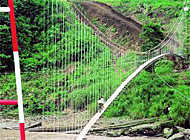Toni el Suizo: building bridges between peoples

Toni Rüttimann brings people together by building bridges - real ones and symbolic ones.
“Linking people, communities, countries, even continents, is so important nowadays,” Rüttimann says.
The Swiss are famed for their humanitarian work and their engineering prowess. For the past 15 years, the man universally known as “Toni el Suizo” (“Swiss Tony”) has combined these two qualities by building suspension bridges in isolated communities – many of them affected by natural disasters – throughout Latin America.
“In these countries, people can die because they are cut off,” Rüttimann told swissinfo
One of his simple pedestrian bridges, 50 metres long and 1.5 metres wide, will allow peasants to take their produce to market, their sick to hospital and their children to school.
Changing lives
“These bridges can change people’s lives. It gives them a way of being free,” Rüttimann says. “They have learnt that bridges don’t have to be built by engineers, companies or governments. They can change their own fate with their own efforts.”
When Rüttimann started out in 1987 he was neither an aid worker nor an engineer. He was a naïve and idealistic 19-year-old student, who “felt a fire within” to do something after seeing television images of a devastating earthquake in Ecuador.
Armed only with SFr9,000 in donations from people in his local community – in Pontresina, canton Grabünden – he set off for the disaster area, on the edge of the Amazon jungle.
He spoke no Spanish, knew no one in Ecuador and had no technical skills.
Cheap and effective
When he arrived it became clear there was an urgent need for infrastructure to be restored. Ruttimann developed a cheap and effective system for building suspension bridges using steel pipes and cables salvaged from the oil industry – a system that still serves him well to this day.
Instead of spending a couple of months in Ecuador before going to university, Toni el Suizo stayed ten years. Since his first expedition, Rüttimann and his Ecuadorean colleague, Walter Yañez, have built more than 160 bridges, mostly in Latin America, improving the quality of life for hundreds of thousands of people.
They went to Honduras, then recently battered by Hurricane Mitch. The need for bridges was desperate but, unlike Ecuador, Central America does not have a major oil industry. Rüttimann managed to persuade oil companies in Houston to donate the necessary cables and pipes.
In the space of 12 months, he had built 30 bridges, including one linking Honduras with El Salvador.
Built in three days
The pedestrian suspension bridges he builds typically take three days to erect. Most of the bridges have a central span of around 50 metres, though he has erected longer ones, the longest having a span of 264 metres.
Because he relies heavily on scrap material and donations from oil and transport companies, and the hard work and goodwill of the communities concerned, the bridges cost only a fraction of what they would cost if they were built by a government or private company.
The design has been simplified to such an extent that it can be transferred anywhere – even to other continents. Last year Rüttimann built his first bridge in Cambodia – the first of many.
“The system holds up. It can be transferred to any country and any culture,” he says, revealing that he would like to see similar projects on every continent.
Fifteen years is a long time to be doing one thing, even if it is as rewarding as giving isolated people contact with the rest of the world. But Toni Rüttimann has yet to tire of bridge-building.
“I have fallen in love with bridges. I plan to do this for the rest of my life,” he says.
by Roy Probert

In compliance with the JTI standards
More: SWI swissinfo.ch certified by the Journalism Trust Initiative









You can find an overview of ongoing debates with our journalists here . Please join us!
If you want to start a conversation about a topic raised in this article or want to report factual errors, email us at english@swissinfo.ch.